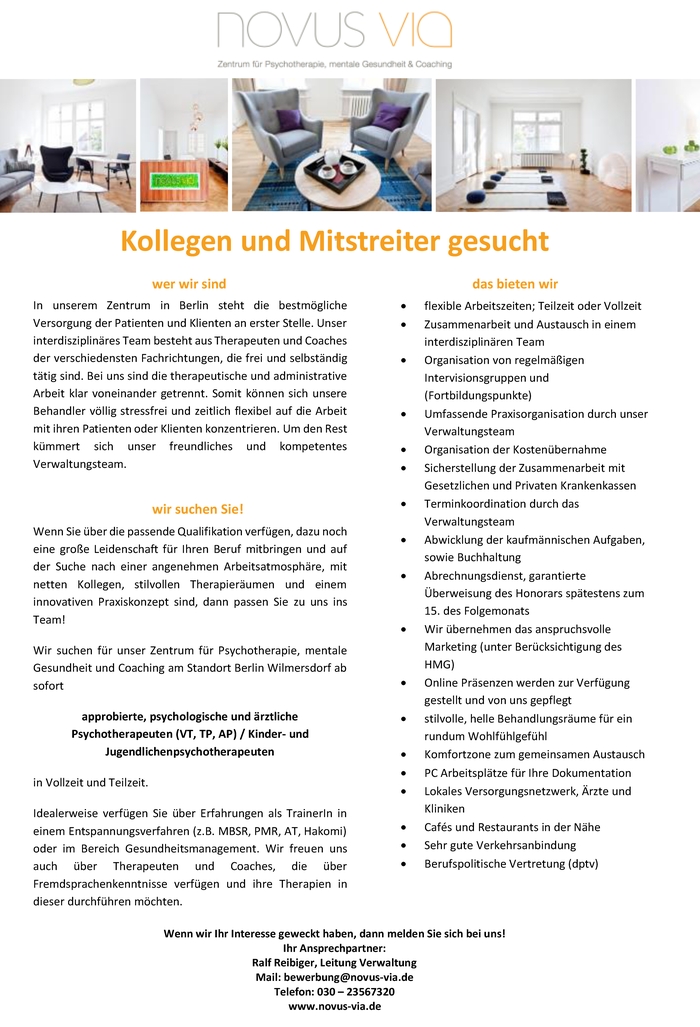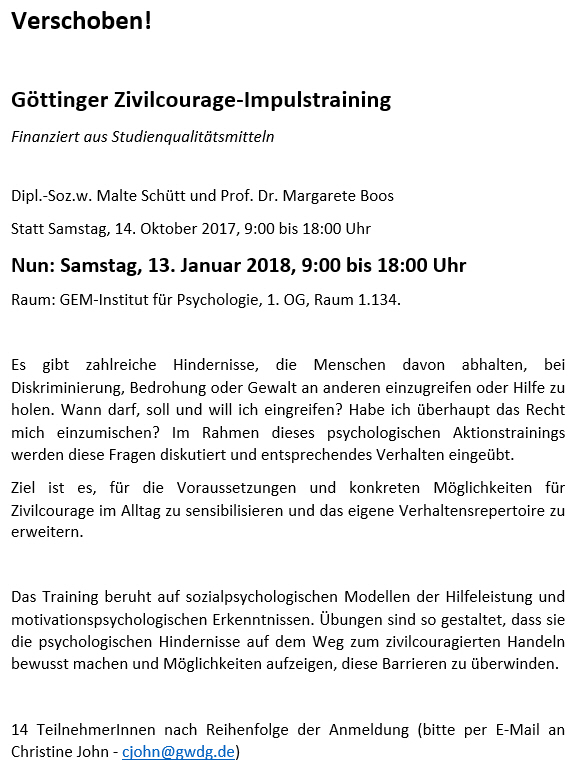Modul M.104 (Prof. Waldmann): 0
Modul M.204 (Prof. Mattler): 3
Modul M.306 (Prof. Penke): 3
Modul M.403 (Prof. Rakoczy): 4
Modul M.506 (Prof. Schulz-Hardt): 6
Modul M.603 (Prof. Boos): 0
Modul M.704 (Dr. Brockmeyer): 0
Modul M.1004 (Prof. Schacht): 1
Modul M.1004 (Prof. Mani): 0
Monat: Oktober 2017
Einladung zum Vortrag
Dear colleagues,
This is a quick reminder of tomorrow’s talk by Prof. Dr. Janette Atkinson (University College London, Oxford University) and Prof. Dr. Oliver Braddick (Oxford University) on „The Developing Visual Brain – from Newborns to Numeracy“ to which you are cordially invited.
Time: Thursday, 12th October 2017, 17.00
Location: GEMI (Goßlerstraße 14), R. 1.134
Please find further information below and attached. We look forward to seeing you at this first talk as part of our Affective Neuroscience Colloquium.
Best wishes,
Louisa Kulke
The Developing Visual Brain – from Newborns to Numeracy
Janette Atkinson & Oliver Braddick
Visual development forms the basis of social and cognitive development in the first years of life. We will illustrate some key developments with a short video. We have tracked the development of visual abilities in infants and young children, to provide a unique window into the developing visual brain, both typical and atypical. Our work has helped to establish the major transition from a largely subcortical visual brain system at birth to the characteristic mechanisms of cortical vision and their control over subcortical visual responses. We have developed novel infant-friendly tests, both cortical event- related potentials measures and behavioural, to identify delays in visual development in the first year of life which are important for pattern, movement, depth perception , the cortical control of attention shifts and the timing of the onset of visuomotor and visuo-cognitive milestones. These measures have proved to be sensitive indicators of the effects of early brain injury and premature birth in predicting later neurocognitive outcomes..
Not all parts of the cortical visual system are equally vulnerable. Tests of children’s sensitivity to global form and global motion ( coherence thresholds) show that the global motion system, while starting to function early at around 2-3 months of age , is particularly impaired in a wide range of developmental disorders, both genetic and acquired (in Williams Syndrome, autism, Fragile X, congenital cataract, hemiplegia, preterm birth). This differential impairment has led us to the hypothesis of ‘dorsal stream vulnerability’ in which poor motion performance is associated with a cluster of attentional, spatial, and visuo-motor deficits. Our recent work with a large cohort of 150 typically developing children in San Diego shows that individual differences in global motion sensitivity are associated with the brain growth in an area within parietal cortex around the intraparietal sulcus, which has been widely implicated as important part of the network used attentional control and in numerosity judgements and mathematics. In addition, individual differences in motion sensitivity is associated with integrity of a major white matter fibre tract linking parietal and frontal lobes, which has been implicated as an essential part of both parieto-frontal networks for attention Consistent with this, children’s global motion, but not global form, performance, is correlated with measures of mathematical achievement and numerosity judgments. We can speculate on how far-reaching these differences in early visual brain development really are, and what are the dynamics of alternative developmental trajectories.
Master: Modul M.Psy.101
Die Einführungsveranstaltung findet für alle Teilnehmer am 17.10.17 um 12:15 Uhr in Raum 1.134 statt.
Studienbüro: Ausfall Sprechstunde
Aufgrund von Informationsveranstaltungen im Rahmen der Erstsemester-Orientierungswoche muss meine Sprechstunde morgen (Mittwoch, 11.10.) leider entfallen!
Praktikumsstelle zu vergeben
Die Abteilung für Personaldiagnostik der Lufthansa Technik in Hamburg hat ab Januar eine Praktikumsstelle zu vergeben.
Auf die Stellenanzeige führt folgender Link: https://career.be-lufthansa.com/index.php?ac=jobad&id=52100
Psychologisches Angebot für Geflüchtete Göttingen (PAfGG) sucht dich!
Das neue Semester startet und wieder sind wir auf der Suche nach engagierten neuen Mitgliedern! Du würdest gerne mehr über unsere psychosoziale Beratungstätigkeit für Geflüchtete erfahren und könntest dir vorstellen, selbst BeraterIn bei uns zu werden? Dann komm zu unserem Einsteigerabend und lern uns kennen – wir freuen uns auf dich!
Wann? Donnerstag, 26.10., 18.00
Wo? Vortragsraum im Erdgeschoss des Lern- und Studiengebäudes (Platz der Göttinger Sieben 3a)
Hier findest du nähere Informationen zu uns: https://www.psych.uni-goettingen.de/de/pafgg
Und hier geht’s zur Facebook-Veranstaltung: https://www.facebook.com/pafggoettingen/posts/538114486539651
Auffrischungsseminar zur Literatur- und Quellen-Suche
Anmeldung noch möglich für das „Auffrischungs-Seminar zur Literatur- und Quellen-Suche“
am 13.10. und 20.10.
Anmeldung: Bitte per E-Mail an Natasha Reed, natasha.reed@uni-goettingen.de
Termine: jeweils 13.10.2017, 9:00 bis 13:00 Uhr oder 20.10.2017, 13:00 bis 17:00 Uhr
Dozentin: Natasha Reed
Das Seminar findet in einer halbtägigen Sitzung im Computerpool statt (Heinrich-Düker-Weg 12, Raum 0.481). Der Inhalt der beiden Sitzungen ist gleich.
Max. Teilnehmerzahl: 20
Das Seminar ist ausgerichtet auf Bachelor-Studierende der Psychologie und bietet Ihnen die Gelegenheit, Ihre früheren Kenntnisse der Literatursuche zu aktualisieren und ggf. zu erweitern. Das Ziel des Seminars ist es, Sie anhand praktischer Rechercheaufgaben darin zu unterstützen, Ihre Literatur-Suche zu optimieren und so erfolgreich wie möglich zu machen.
Um Sie bei der Vorbereitung eigener Projekte, Hausarbeiten und schließlich der Bachelorarbeit zu unterstützen, konzentriert sich das Seminar auf folgende Aspekte der Literatur-Suche:
- die Nutzung verschiedener Quellen, z.B. Online-Kataloge der Universitätsbibliothek oder Online-Quellen wie ‚Google Scholar‘ und ‚Web of Knowledge‘
- Hinweise auf die Quellen-Suche durch Nutzung von Schlüssel-Wörtern
- Nutzung des Literaturverwaltungswerkzeugs ‚Citavi‘
- Regeln des Zitierens und guter wissenschaftlicher Praxis
PsychotherapeutIn gesucht

Bachelor: Modul B.Psy.104
Am 18.10.17 findet um 16.15 Uhr (Zeitfenster Vorlesung, ZHG006) eine kurze Einführung für alle statt. Dort werden auch die Teilnehmer auf die Seminare verteilt.
Die Seminare beginnen erst am 30.10.17.
Zivilcourage-Impulstraining verschoben
